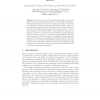Free Online Productivity Tools
i2Speak
i2Symbol
i2OCR
iTex2Img
iWeb2Print
iWeb2Shot
i2Type
iPdf2Split
iPdf2Merge
i2Bopomofo
i2Arabic
i2Style
i2Image
i2PDF
iLatex2Rtf
Sci2ools
109
click to vote
ECCV
2004
Springer
2004
Springer
An Information-Based Measure for Grouping Quality
We propose a method for measuring the quality of a grouping result, based on the following observation: a better grouping result provides more information about the true, unknown grouping. The amount of information is evaluated using an automatic procedure, relying on the given hypothesized grouping, which generates (homogeneity) queries about the true grouping and answers them using an oracle. The process terminates once the queries suffice to specify the true grouping. The number of queries is a measure of the hypothesis non-informativeness. A relation between the query count and the (probabilistically characterized) uncertainty of the true grouping, is established and experimentally supported. The proposed information-based quality measure is free from arbitrary choices, uniformly treats different types of grouping errors, and does not favor any algorithm. We also found that it approximates human judgment better than other methods and gives better results when used to optimize a seg...
Computer Vision | ECCV 2004 | Information-based Quality Measure | Segmentation Algorithm | True Grouping | Unknown Grouping |
| Added | 15 Oct 2009 |
| Updated | 15 Oct 2009 |
| Type | Conference |
| Year | 2004 |
| Where | ECCV |
| Authors | Erik A. Engbers, Michael Lindenbaum, Arnold W. M. Smeulders |
Comments (0)

